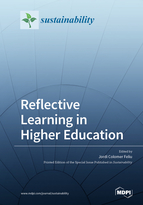Reflective Learning in Higher Education
A special issue of Sustainability (ISSN 2071-1050). This special issue belongs to the section "Sustainable Education and Approaches".
Deadline for manuscript submissions: closed (20 December 2019) | Viewed by 63861
Special Issue Editor
Interests: reflective learning; STEM education; tertiary education; education for sustainable development; science education; curriculim building student skills
Special Issues, Collections and Topics in MDPI journals
Special Issue Information
Dear Colleagues,
This Special Issue will comprise a selection of papers addressing “Reflective Learning in Higher Education”. The Sustainability journal seeks papers addressing the development of both reflective teaching and learning in higher education to promote sustainable education. Papers from all disciplines, (i.e., not only education, psychology, social sciences, sciences, nursing, and engineering disciplines, but also from multidisciplinary studies) where reflection is at the core sustainable development, are welcome.
Papers may explore reflection within higher education and/or on practice in higher education, not only as in-house and external individuals and collective initiatives and activities, that focus on reflection and the generation of knowledge, but also on the transformation outputs of the learning communities. Emphasis on both reflective practices and communities and linking reflective learning and the development of professional identity through reflection are also welcome.
Papers may also address the connections between theoretical and applied research on reflective practices, knowledge generation in all areas, professional practice and identity, through theoretical definition, situated and grounded practice, and transformative knowledge.
Prof. Jordi Colomer Feliu
Guest Editor
Manuscript Submission Information
Manuscripts should be submitted online at www.mdpi.com by registering and logging in to this website. Once you are registered, click here to go to the submission form. Manuscripts can be submitted until the deadline. All submissions that pass pre-check are peer-reviewed. Accepted papers will be published continuously in the journal (as soon as accepted) and will be listed together on the special issue website. Research articles, review articles as well as short communications are invited. For planned papers, a title and short abstract (about 100 words) can be sent to the Editorial Office for announcement on this website.
Submitted manuscripts should not have been published previously, nor be under consideration for publication elsewhere (except conference proceedings papers). All manuscripts are thoroughly refereed through a single-blind peer-review process. A guide for authors and other relevant information for submission of manuscripts is available on the Instructions for Authors page. Sustainability is an international peer-reviewed open access semimonthly journal published by MDPI.
Please visit the Instructions for Authors page before submitting a manuscript. The Article Processing Charge (APC) for publication in this open access journal is 2400 CHF (Swiss Francs). Submitted papers should be well formatted and use good English. Authors may use MDPI's English editing service prior to publication or during author revisions.
Keywords
- Sustainable education
- reflective learning
- higher education






